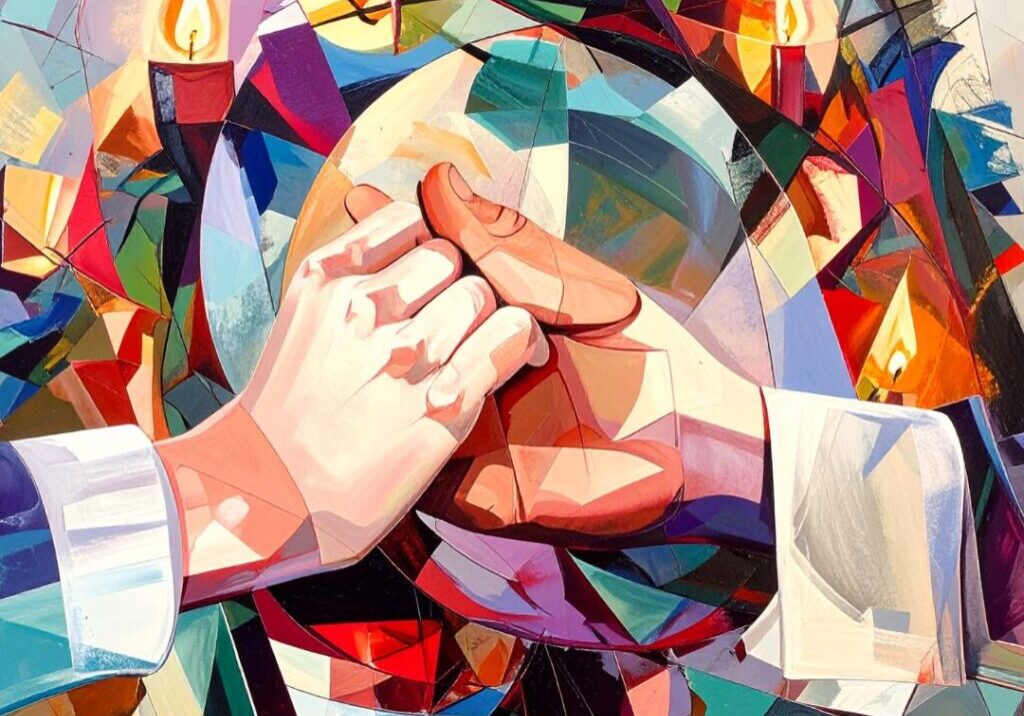Becoming Whole
By Rebecca Mays
Many of us have heard the maxim that “the whole is greater than the sum of the parts.” There is a flow, a stream of connections in the natural world around us that informs our environment and our inner lives. We as human beings are not separate from the ongoing flow in nature. In growing in our understanding of our connection with nature, we receive “ah-ha” moments of insight as we create our future through curiosity and deep listening.
Ilia Delio writes about this connection and how it organizes our search for wholeness as a community. ”Nature is like a choreographed ballet or a symphony. . . .Bees and ants, for example, are unable to survive in isolation, but in great numbers they act almost like the cells of a complex organism with a collective intelligence and capabilities for adaptation.”[1]
Our spiritual strivings through time as a human colony demonstrate a tacit dimension in flow with nature wherein new insights come in flashes through one person on behalf of the many. Just as nature is never at rest, the flow of our evolution is also creatively generative. Our choice is to open to this tacit dimension of our evolution and to choose not to act against it. The following vignettes are examples of persons whose evolving personhood experienced “ah-ha” moments of insight that transformed their choices of belief, behavior, and belonging.
In the eighteenth century, a Quaker woman began to receive new insights of Jesus/Yeshua through dreams. In a powerful dream/vision, she saw an androgynous figure she called Christ speaking of the glory of God “greater than even the Quakers in their first coming forth.”[2] She became more whole in understanding that even though the particular religious community in which she belonged held great meaning for her, she was being shown something expanding, moving, full of life that was still to come. Mary Penington opened to what was revealed to her in a way that transformed her ministry and influence.
In the early twentieth century, a Quaker/Methodist woman was riding the Market Street tram in Philadelphia when the sight of two passengers captivated her God-loving attention. She experienced a fresh insight for her that re-oriented her ministry in the Wesleyan holiness movement to reassure people of “universal salvation.”[3] Hannah Whitall Smith’s perceptions deepened and expanded about how God was at work in the world.
In this twenty-first century, I have facilitated a leadership workshop for university-aged international students. The State Department sponsors them for five weeks in the U.S to learn about religious pluralism. Of differing religious traditions, they visit in religious communities previously unknown to them. A couple of their lived experiences demonstrate the “ah-ha” moments that expanded their horizons.
A young Maronite Christian woman from Lebanon formed friendships with members of the Baha’I religious community. Her devotion in front of beautiful icons met the conviction in those friends who use no images to express their devotion. Respect for difference can be an act of toleration, but her experience went deeper. She described the “closeness” she felt with them that invited her to appreciate the differences. She felt a new vision of what religion can be, an act of becoming more whole, more fully human.[4]
A young Muslim man from Iraq is studying to be a doctor. His “ah-ha” was to learn that other traditions than is own Shi’a Islam also practice fasting to deepen a relationship with God. He planned during his next Ramadan fast, not only to reread the Qur’an, but also to add texts from other traditions that express devotion through differing fasting practices.[5]
Through time and with others, the moments of expansion, of becoming more whole, are born of curiosity and deep listening. We awaken to an appreciation for differences that might have otherwise kept us in our hunger for wholeness. We want to move beyond toleration to a unity that differentiates with increased understanding of the connections among us and with nature.[6]
At the Center for Christogenesis, we want to birth a collective intelligence with benefit for individuals and groups. To that end, the Center has just launched a podcast series, “A Hunger for Wholeness” that addresses the connections between religion and science, between the sacred and the secular. We respect the tacit dimension of experiment and wisdom such a connection engenders. Please join us in listening to it: place link
For discussion and dialogue, listeners are invited to join a Christopany group to study and to share experiences of “ah-ha” moments where curiosity and deep listening reveal new insights. Please join as leader or member on the website for the Center for Christogenesis and click the tab for groups. We look forward to expanding with you as we become a more whole earth community of plants, animals, and people.
“On the Ridge”[7]
Poem by Mark Nepo, author of the #1 New York Times bestseller The Book of Awakening
We can grow by simply lis-
tening, the way the tree on
that ridge listens its branches
to the sky, the way blood
listens its flow to the site
of a wound, the way you
listen like a basin when
my head so full of grief
can’t look you in the eye.
We can listen our way out
of anger, if we let the heart
soften the wolf we keep in-
side. We can last by listening
deeply, the way roots reach for
the next inch of earth, thy way
an old turtle listens all he hears
Into the pattern of his shell.
[1] Ilia Delio, The Unbearable Wholeness of Being: God, Evolution, and the Power of Love (Maryknoll, NY: Orbis Books), p. 32-33.
[2] Mary Garman, Judith Applegate, Margaret Benefiel, Dortha Meredith, eds., Hidden in Plain Sight: Quaker Women’s Writings 1650-1700 with foreword by Rosemary Radford Ruether, (Wallingford,PA: Pendle Hill Publications), p.225.
[3] https://tentmaker.org/books/unselfishness-of-god.htm, Chapter 22 “The Third Epoch in My Religious Life.”
[4] Personal Interview, Summer, 2022
[5] Personal Interview, Summer, 2022
[6] David Landis Barnhill and Roger S. Gottlieb, eds., Deep Ecology and World Religions: New Essays on Sacred Ground (Albany, NY: State University of New York Press, 2001), p. 20.
[7] Mark Nepo, Reduced to Joy (Berkely, CA: Viva Editions, 2013), p. 100.
 View print-friendly version
View print-friendly version
3 Comments
Related Posts

Rewiring Our Lives Together, the Franciscan Way
The Season of Incarnation We are in the season of Incarnation—God becoming flesh. It is a beautiful time of the year that brings out the best of humanity, even in…


Thank you, Rebecca, for this very beautiful piece!
Joe, I always enjoy reading your insightful and beautifully crafted posts. You speak of a “clarifying voice” and I agree, but I think of it as a collective voice. I am not looking for a savior, but rather the collective “we” to become unified in thought and action. The prophets are already among us, striving to be heard amidst the clamor. And while I share your criticism of the Church to some degree, I see the Catholic Church here in Kentucky (where I have somehow ended up) doing some of the best social work (better than governmental agencies), especially as pertains to ministry to immigrants and the poor. We have large Latino, Burmese, Afghan and now Ukrainian communities here in western KY. And the Church in New Orleans, where I lived for many years, was the first to minister to the LGBTQ community and those with HIV/AIDS. I had a friend who died of AIDS at Lazarus House in New Orleans decades ago. In terms of practical theology, we often do a good job in our local communities but betray this work in the voting booth. It’s an odd dynamic.
I agree, however, that our theology needs to evolve in order to meet the needs of the future before it’s too late, as we have not adequately addressed climate change and other pressing problems. With that said, I teach about climate change in all of my theology courses, including World Religions, which is so enjoyable, and my university students are always on board, no matter if they are fundamentalists, progressive Christians, Jews, Muslims, agnostics or atheists. This is something they can get behind and they are fed up with those in power who aren’t doing enough.
It’s interesting that you mention Thomas Berry here. I studied with him while working on my MPS, with a focus in Religion and Ecology. A Teilhardian scholar, he called himself a “geologian” rather than a “thelogian,” and much of his theology was implicit rather than explicit — something he was criticized for by his own Passionist religious order at the time. Still, he has had a profound effect on theology. I am ever grateful to Ilia Delio, who boldly undertakes the task of integrating science and theology head on. Surely she is a prophet and we join our prophetic voices to hers and to those of one another.
The new story that Thomas Berry and Teilhard gave us the ingredients to tell has yet to be told, and yes, that’s owing to the “loss of integrity” (fragmentation of disciplines) characteristic of our splintered age. Advances have been made in science, technology, transportation, and medicine, but not in theology, which remains bogged down in the Middle Ages, unable to reveal to other fields how they are linked to itself, each other, and God in an integrated whole. We gaze at stars with advanced optical resolution but must rely on the unsatisfying metaphors of medieval mystics, instead of telling a struggling world how the images we see fit into the greater story it cannot see, does not know, and therefore cannot tell. Maintaining relevance in explaining how all these advances fit together in a coordinated whole for the greater well-being of the planet falls to religion, which, according to Teilhard, is the particular province of Christianity (Christogenesis). Failing to evolve like other disciplines, the institutional church has lost its relevance, forfeiting the wisdom, insights, and mandate given to it by these integral Jesuits to be on the vanguard in a struggling world fast running out of time. A clarifying voice crying out in the wilderness is what is sorely needed, one who can take us to the promised land of practical synthesis, healing, and making whole.